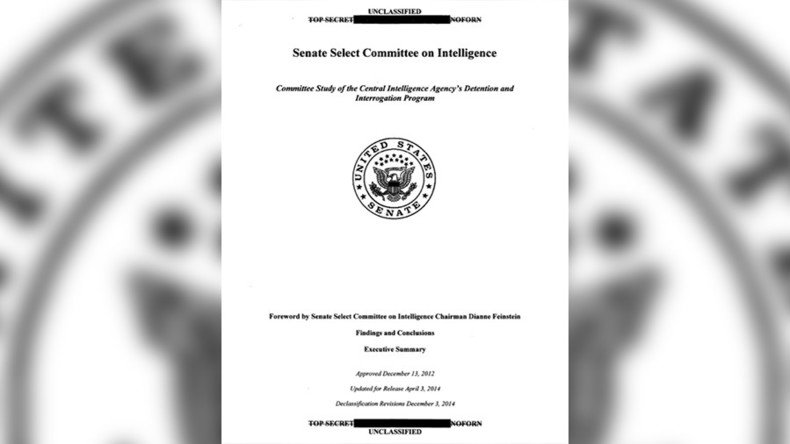Democrats accuse Trump of ‘erasing history’ as GOP recalls copies of torture report

The Trump administration intends to “erase history” by burying the 2014 Senate torture report, leading Democrats said, after federal agencies began sending back their copies to the Senate Intelligence Committee at the request of its Republican chairman.
Senator Richard Burr (R-North Carolina) told Reuters that his staff is retrieving the copies from executive branch agencies, and will “enact the necessary measures to protect the sensitive sources and methods contained within the report.”
According to Sen. Dianne Feinstein (D-California), so far the Director of National Intelligence (DNI), the Central Intelligence Agency (CIA) and the CIA’s inspector general have returned their copies of the report. Copies of the report are also in the possession of the FBI and the Justice, State and Defense Departments.
READ MORE: SCOTUS balks at CIA torture report release request
Feinstein, under whose direction the report was produced, accused Burr of attempting to bury the inconvenient truth about the CIA’s torture program under the presidency of George W. Bush.
“No senator – chairman or not – has the authority to erase history. I believe that is the intent of the chairman in this case,” she said in a statement Friday.
“Trump and Sen. Burr are clearly paving the way for the lies used to justify the illegal and dangerous torture program,” Sen. Ron Wyden (D-Oregon), another prominent Democrat on the intelligence committee, said on Twitter.
The insecure & power hungry are attempting to erase history. #TortureReport
— Ron Wyden (@RonWyden) June 2, 2017
Amnesty International USA also condemned Burr’s request.
“This could be the Trump administration’s first step in a plan to reinstate a policy of torture. By burying the history of torture, the Trump administration risks repeating it,” said Elizabeth Beavers, a senior Amnesty campaigner, adding: “The report must be made public.”
The 6,700-page report, containing 38,000 footnotes, took six years to compile. While the unclassified executive summary was released to the public in December 2014, the classified version was sent to the intelligence and security branches of the Obama administration for reading and review. The reception was frosty in places; according to reports from 2015, the Department of Justice refused to take the report out of its package.
President Barack Obama also refused to declassify the report or make it available under the Freedom of Information Act (FOIA). Since executive branch agencies are subject to FOIA but Congress is not, Democrats fear that handing all the copies to Burr might bury the report’s contents.
Despite Republican efforts, Obama is keeping a copy of the torture report safe in his presidential library. https://t.co/v2DldBKoluhttps://t.co/sJ5GxZ3DUG
— The Intercept (@theintercept) June 2, 2017
However, as the Intercept reported last year, at least one copy of the report will remain out of Burr’s reach – though it will stay classified for at least another decade – in Barack Obama’s presidential library.
Burr has previously requested a recall of the report in 2015, when he first took over the intelligence committee. The Obama administration did not respond, while the Senate Democrats also voiced concerns about the report’s possible destruction. In December 2016, the White House counsel informed Feinstein that Obama would keep a copy of the classified report in his presidential library.
According to the letter by W. Neil Eggleston, Obama instructed the archivist that “access to classified material, among other categories of information, should be restricted for the full 12 years allowed under the act.”
The report concluded that the CIA’s “enhanced interrogation” programs, using techniques such as waterboarding, were more brutal and less effective than the agency had previously disclosed and that not a single terrorist attack had been foiled by the practice.














